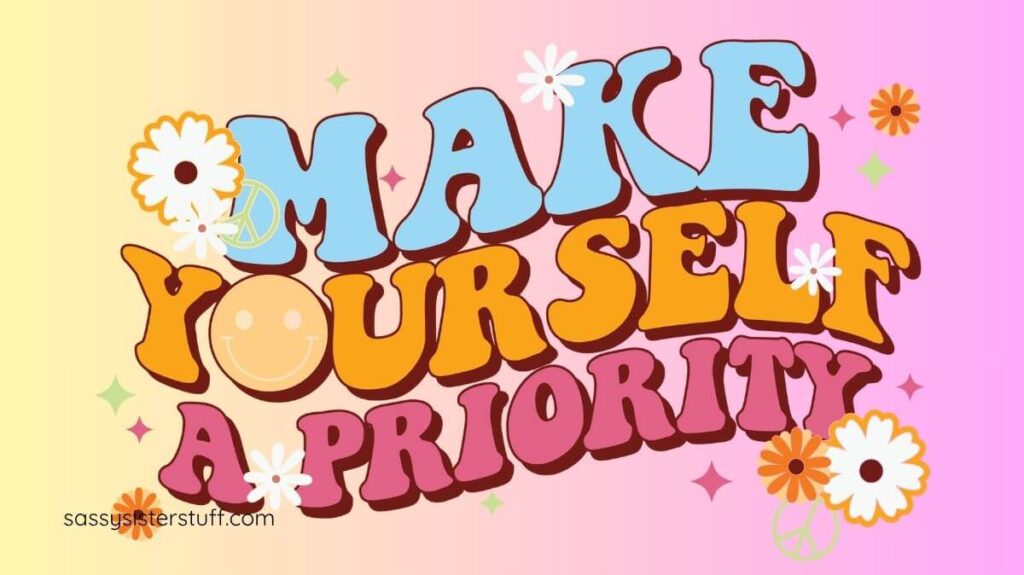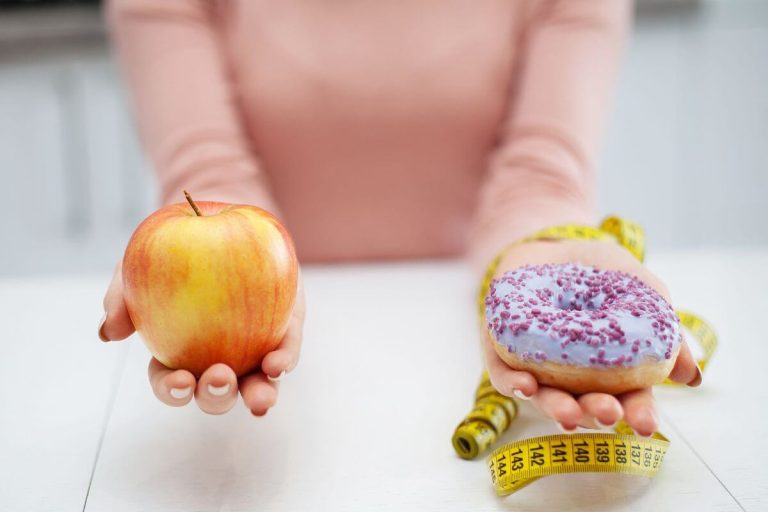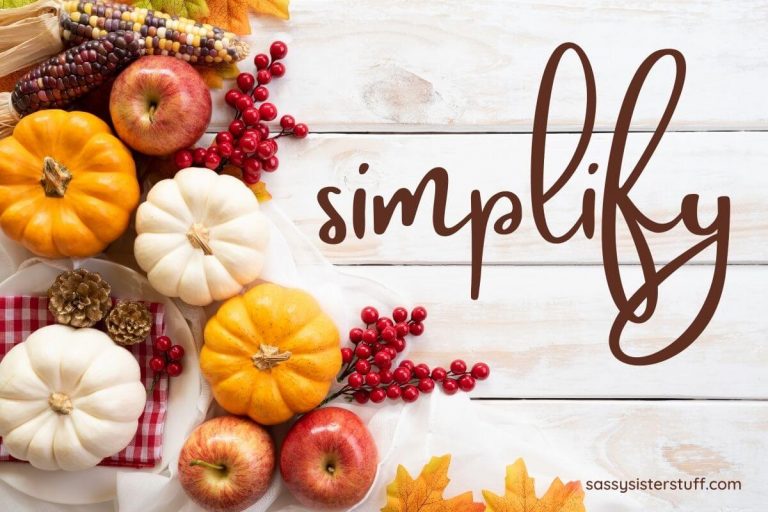How to Stop Feeling Guilty for Putting Yourself First
Have you ever made a decision for yourself—just to feel a wave of guilt crash over you seconds later?
Whether it’s saying no to a family obligation, booking that solo weekend getaway, or simply choosing rest over responsibility… that creeping feeling of “I shouldn’t be doing this” is all too familiar for many women, especially in midlife and beyond.
But here’s the truth: putting yourself first isn’t selfish—it’s positive selfishness. And that’s a good thing. I’ve learned it over the years and now I’m going to help you learn it.
In this season of life, it’s time to rewrite the narrative that says everyone else must come before you.
You’ve spent decades showing up for others—your children, partner, parents, career, and community. Now? It’s your turn.

This isn’t about neglecting your loved ones or ignoring responsibilities. It’s about recognizing that self-care, boundaries, and honoring your needs are essential—not optional.
I’ve written a lot about this kind of empowered living, from embracing positive selfishness to prioritizing self-care without apology. So the concept shouldn’t be new to you but you might need some strategies to make it happen!
So let’s talk about how to stop feeling guilty for putting yourself first—and start celebrating the strength, wisdom, and deservingness that comes with this beautiful chapter of life.

#1 Recognize That Putting Yourself First Is Healthy
Taking care of your needs first isn’t a sign of selfishness; it’s a vital part of maintaining your well-being.
When you prioritize yourself, you actually become better equipped to support others, rather than running yourself into the ground.
It’s normal to feel uneasy about this shift, especially if you’re used to putting everyone else first, but reminding yourself of its importance can be freeing.
Often, guilt sneaks in because of long-held beliefs or external pressures rather than reality. Understanding that self-care sustains your ability to thrive helps lighten that burden.
- Physical Health: Maintaining your physical health by resting and eating well replenishes your energy, allowing you to tackle daily tasks with greater ease and positivity. Good health also reduces stress-related illnesses that can drain your spirit. Prioritizing your body is foundational to overall wellness.
- Emotional Well-being: Taking time to address your emotions enables healthier response patterns and reduces burnout. When you check in with yourself instead of ignoring feelings, it fosters emotional resilience. This self-awareness is a gift that benefits both you and those around you.
- Better Relationships: Paradoxically, focusing on your needs often leads to deeper, more authentic relationships because you bring a more balanced presence. People generally respond well to your clarity and honesty. This sets a healthy standard for mutual respect.
- Increased Productivity: When rested and centered, you can perform tasks more effectively and with less frustration. Your capacity to concentrate and problem solve improves noticeably. This boosts both personal satisfaction and accomplishments.
- Sustainable Lifestyle: Prioritizing yourself regularly builds a lifestyle you can maintain longer without sacrifice or resentment. It guards against unhealthy patterns that lead to exhaustion or disengagement. In the long term, this is a rewarding investment.
By embracing the idea that putting yourself first replenishes, not drains, your resources, you gain permission to treat yourself kindly. This mindset paves the way toward a healthier, more joyful life.
#2 Redefine What Selfishness Means to You
Guilt often stems from the fear of being selfish, but what does selfish actually mean in your heart?
Reconsidering this definition can be enlightening.
Selfishness is usually described as putting yourself before others at their expense, but the truth is more nuanced.
Caring for yourself contributes to your ability to contribute meaningfully to others, creating a healthier balance. Shifting your perspective on this word releases a lot of unfair judgment.
- Self-Care vs. Selfishness: Self-care involves intentional actions to maintain health and happiness, whereas selfishness generally disregards others’ feelings. Differentiating these helps you recognize your boundary-setting as positive rather than negative. This awareness reframes your thoughts.
- Examples from Nature: Even the most nurturing animals take breaks to care for their own needs, illustrating that self-priority is natural. This can help you see yourself as part of a larger, balanced ecosystem. It’s not an indulgence; it’s survival.
- Cultural Bias: Some societies emphasize putting others first so strongly that self-care feels taboo. Recognizing these influences allows you to critically assess if your guilt is culturally inherited rather than personally true. This insight encourages growth with compassion.
- Impact of Language: The words you use to describe yourself have power. Changing “selfish” to “self-loving” or “self-respecting” softens the inner dialogue and invites acceptance. Language can shift emotions and perspectives profoundly.
- Gradual Shifts: You don’t need to overhaul your mindset overnight. Small reframes every day build a new narrative, where putting yourself first becomes a sign of self-awareness and maturity. Patience with yourself in this process is essential.
By reshaping what selfishness means, you guard yourself against unnecessary guilt and open the door to a kinder self-relationship.

#3 Embrace Boundaries as Acts of Respect
Boundaries get a bad rap sometimes because they sound rigid or unfriendly, but they are actually essential for healthy relationships.
Setting limits isn’t about shutting others out; it’s about creating a space where you and others can interact respectfully.
This clarity builds trust and mutual understanding. When you respect your own limits, you’re teaching others how to treat you.
- Defining Boundaries: Boundaries are personal guidelines that protect your emotional and physical wellbeing. They can involve time, energy, or emotional availability. Clarifying these helps prevent being overwhelmed or resentful.
- Communicating Clearly: Expressing boundaries doesn’t need to be complicated or confrontational. Using simple, calm language conveys your needs without blame or defensiveness. Clear communication invites others to respect your space.
- Recognizing Boundary Violations: Knowing when a boundary is crossed is important. This might feel like discomfort, irritation, or exhaustion. Identifying these feelings early helps you take action and recharge.
- Respecting Others’ Boundaries: Setting your boundaries also involves respecting those of others. This reciprocal approach deepens relationships and models healthy interaction. It reminds you that everyone deserves care.
- Boundary Practice as Growth: Establishing boundaries is a skill that improves with practice and patience. It often requires courage, especially when it’s new territory. Each success builds your confidence and self-esteem.
By embracing boundaries as respectful acts, you foster healthier connections with yourself and those around you. It’s a win-win.
#4 Practice Self-Compassion Daily
Self-compassion is like giving yourself a comfort hug when things feel tough. It replaces harsh self-judgment with gentle understanding.
When you’re kinder to yourself, guilt loses its grip and you begin healing old wounds. This practice is especially important when learning to put yourself first because it can be uncomfortable at first.
- Recognizing Common Humanity: Realizing everyone struggles sometimes can lessen feelings of isolation and guilt. Knowing you’re not alone in your experiences encourages patience. This mindset fosters connection rather than self-criticism.
- Mindful Awareness: Paying attention to your thoughts and emotions without judgment allows you to respond with care rather than harshness. Mindfulness creates space for healing and growth. It changes your relationship to guilt.
- Soothing Self-Talk: Replace negative inner dialogue with comforting phrases like “It’s okay to need a break” or “I am doing my best.” This builds a positive, supportive inner voice. Over time, these affirmations rewire your brain for kindness.
- Physical Acts of Compassion: Small gestures—wrapping yourself in a cozy blanket or sipping a warm drink—can create a soothing experience that supports emotional wellbeing. Incorporating self-care rituals reinforces self-love. These moments replenish your energy.
- Journaling Compassion: Writing down self-compassionate thoughts helps anchor this mindset by giving it a tangible form. It’s a reflective practice that reduces negativity. Journaling becomes a trusted friend during challenging moments.
Daily self-compassion nurtures a gentle foundation that makes prioritizing yourself easier and more sustainable.

#5 Surround Yourself with Supportive People
Your environment plays a huge role in how comfortable you feel putting yourself first. When you’re around people who understand and uplift you, guilt fades faster.
Supportive relationships create a safe space where your needs are respected and encouraged. This doesn’t mean everyone will always agree, but feeling genuinely seen helps.
- Identifying Supportive People: Look for individuals who listen without judgment and celebrate your growth. These people generally respect boundaries and promote positivity. They may be friends, family, or coworkers.
- Setting Expectations: It’s okay to communicate your need for support as part of building these connections. Expressing how you’d like to be supported lets others know what matters. This transparency deepens relationships.
- Limiting Negative Influences: While you may not cut people out easily, recognize when certain interactions drain or guilt-trip you. Reducing time with negative influences protects your wellbeing. This doesn’t need to be dramatic; gradual change is fine.
- Seeking Like-Minded Communities: Joining support groups, classes, or online forums focused on self-care can expose you to others with similar goals. Shared experience builds validation and encouragement. This social investment pays off.
- Offering Support in Return: Healthy relationships are reciprocal. Supporting others’ needs strengthens bonds and creates a mutual understanding. This balance nurtures community.
Creating a supportive network helps maintain your commitment to self-prioritization and lessens feelings of isolation or guilt.
#6 Reflect on the Positive Outcomes of Self-Care
Taking time to reflect on the good that comes from putting yourself first creates a more balanced view. Positive reinforcement helps motivate and heal your mindset. When you notice improvements in mood, energy, or relationships, it becomes easier to prioritize self-care.
- Mood Improvements: When rested and cared for, you notice feeling calmer and more joyful throughout the day. These mood shifts highlight the benefits of tuning in to your needs. Positive emotions reinforce the habit.
- Increased Energy: Prioritizing downtime boosts your physical and mental stamina, which makes daily tasks feel easier. This change can be surprising if you expected exhaustion. It’s a powerful motivator to continue.
- Better Focus: When guilt and stress lessen, concentration improves. You can finish projects more smoothly and enjoy activities more fully. Highlighting this advantage uplifts your spirit.
- Enhanced Relationships: Putting yourself first can improve your patience and presence with others, making interactions more meaningful. When you’re less drained or resentful, connections deepen naturally. This is a real gift.
- Greater Confidence: Each successful act of self-prioritization reinforces your sense of control and self-worth. Confidence then feeds back into your decisions, reducing future guilt. This cycle supports long-term change.
Reflecting on what you gain shifts focus from sacrifice to growth, making the journey feel worth it.

#7 Give Yourself Permission to Say No
Saying no is one of the simplest and most powerful ways to protect your time and energy.
Many of us carry guilt around this small word because it feels like letting someone down or causing conflict.
But saying no kindly and clearly is an act of honesty and respect for yourself and others. It prevents burnout and fosters healthier relationships.
- Understanding Its Power: Saying no sets a boundary that can prevent overwhelm and preserve your focus. This empowerment gives you space to breathe and prioritize tasks or rest. Knowing this shifts your perspective positively.
- Offering Alternatives: When saying no, sometimes suggesting an alternative or timeline softens the refusal and maintains connection. This shows care without compromising your limits. It’s a thoughtful middle ground.
- Practicing Assertiveness: Saying no clearly without over-explaining builds confidence. Standing firm helps others learn your limits. This assertiveness reduces future guilt around similar decisions.
- Anticipating Reactions: It’s helpful to prepare for possible pushback, remembering that others’ discomfort isn’t your responsibility. Your main job is to honor your needs first. This separates your feelings from theirs healthfully.
- Reinforcing Your Right: Reminding yourself regularly that your time and energy matter supports consistent no’s. Permission comes from within, not outside approval. This self-validation is freeing.
Saying no gracefully and often becomes less intimidating the more you practice. It’s a foundational skill in putting yourself first.
#8 Keep a Journal to Track Your Progress
Writing about your feelings and experiences serves as a valuable tool to observe patterns, progress, and setbacks.
Journaling about learning to put yourself first helps make intangible emotions concrete and manageable.
It also provides a private space to reflect without judgment. This ongoing record encourages self-awareness.
- Recording Emotions: Writing about feelings of guilt or relief reveals triggers and responses over time. This clarity uncovers habits you might not notice otherwise. Awareness invites change.
- Tracking Boundaries: Noting when and how you set boundaries shows progress and obstacles. This helps refine your approach and stay motivated. Progress becomes visible rather than abstract.
- Celebrating Wins: Documenting even small victories encourages positive reinforcement. Reflecting on these successes builds confidence and momentum.
- Exploring Challenges: Journaling difficult moments offers a safe outlet and helps brainstorm solutions. It supports problem-solving without external pressure. Self-dialogue nurtures resilience.
A journal becomes a trusted companion on your path to self-prioritization, grounding your efforts in mindfulness.

#9 Educate Yourself About Mental Health and Self-Worth
Understanding the psychological and emotional foundations of guilt and self-care can demystify your experience. Learning about mental health encourages empathy toward your struggles and curiosity about how to improve.
Knowledge serves as both a shield and a spark, protecting you from misinformation and inspiring new paths.
- Exploring Guilt’s Origins: Researching why guilt exists and its evolutionary role helps normalize your feelings. This context reduces feelings of inadequacy.
- Understanding Self-Worth: Learning how self-esteem develops clarifies why you might undervalue your needs. Education reveals pathways to build greater self-acceptance. This insight fosters change.
- Recognizing Burnout: Studying burnout symptoms equips you to notice when guilt compromises your health. Awareness prompts timely adjustments. This proactive approach prevents long-term harm.
- Finding Resources: Mental health books, podcasts, and articles offer tools and perspectives to grow your self-care practices. Accessing expert guidance enriches your toolkit. Curated knowledge empowers you.
- Destigmatizing Help: Education normalizes seeking professional support if needed, removing shame and encouraging action. This resource can be a catalyst for healing. Knowledge connects you with help confidently.
Educating yourself transforms confusion into clarity and fosters a patient, informed approach to learning how to stop feeling guilty for putting yourself first.
#10 Reframe Negative Self-Talk into Affirmations
The way you talk to yourself can magnify guilt or soothe it. Reframing critical thoughts into affirmations rewires your inner dialogue to be more supportive.
This doesn’t mean ignoring flaws but balancing critique with kindness. Affirmations become reminders of your worth and right to self-care.
- Identifying Negative Thoughts: Catch phrases like “I’m being lazy” or “I don’t deserve this” that fuel guilt. Awareness of these kind of statements helps you intervene. This mindfulness creates choice.
- Creating Positive Statements: For each negative thought, write a reassuring affirmation such as “Taking care of myself is necessary” or “My needs are valid.” Personalizing affirmations increases their power. Repeating them builds new mental pathways.
- Using Present Tense: Phrase affirmations in present tense to reinforce current worth and actions.
- Combining with Visualizations: Saying affirmations while visualizing positive outcomes creates a stronger emotional connection. It helps you internalize the message.
- Regular Practice: Make affirmations part of your daily routine, such as morning reflections or before challenging moments. Consistency is key to lasting change. Over time, affirmations soften guilt.
Transforming your inner voice from critic to coach builds a nurturing mindset that embraces self-prioritization warmly.

#11 Celebrate Small Wins Without Overthinking
Often, the tendency to minimize progress feeds guilt because you feel “not good enough” yet.
Taking time to notice and celebrate even tiny victories helps rewrite this narrative.
This practice encourages a positive, forward-moving attitude and reduces destructive perfectionism thoughts.
- Defining Wins: Wins can be anything from saying “no” to taking five extra minutes of rest. Broadening your definition of a win increases opportunities for celebration. This keeps motivation alive.
- Acknowledging Effort: Recognizing your effort is as important as the outcome. Celebrating effort builds resilience when results take time. Effort is a vital ingredient for change.
- Using Rewards: Combining celebrations with small rewards, like a favorite snack or quiet time, creates positive associations. These incentives delight the brain. This makes your journey enjoyable.
- Sharing with Others: Telling a friend or journaling about your victories amplifies their impact. It creates accountability and connection while supporting self-worth.
- Avoiding Overanalysis: Resist the urge to analyze or diminish your wins. Accept them fully and let gratitude fill in. This mindset cultivates joy and growth.
Small celebrations become fuel that carries you through the challenges of putting yourself first.
#12 Seek Professional Guidance When Needed
Sometimes, guilt about putting yourself first can be deeply rooted or tricky to untangle alone. Seeking help from a therapist or counselor can provide valuable tools tailored to your experience.
Professionals offer impartial perspectives and coping strategies that can accelerate growth. Asking for help is a brave and respectful act.
- Finding the Right Fit: Look for a licensed professional who makes you feel comfortable and understood. Chemistry builds trust and openness. Taking time to research or meet practitioners is worthwhile.
- Clarifying Your Goals: Clearly stating what you want to achieve, such as reducing guilt or improving boundaries, helps focus sessions and track progress. Goal-setting empowers you. It structures the healing process.
- Trying Different Modalities: Therapists may use talk therapy, cognitive-behavioral approaches, or mindfulness techniques, among others. Exploring methods allows you to find what works best for you. Flexibility enhances effectiveness.
- Building Skills: Therapy doesn’t just explore feelings; it teaches practical skills for managing guilt and reinforcing self-care. These tools stay with you long-term and promote independence.
- Normalizing Support: Knowing many people benefit from therapy reduces stigma and encourages use when needed. Seeking support is a sign of strength, not weakness. It aligns with self-prioritization.
Professional guidance can be an inspiring partner on your path, helping you move beyond guilt to embrace self-care fully.

Final Thoughts: How to Stop Feeling Guilty for Putting Yourself First
If no one’s told you lately, let me be the one to say it—you deserve to put yourself first. Not someday. Not when everyone else is taken care of. Now.
Letting go of guilt doesn’t happen overnight, but every step you take toward prioritizing your well-being is a powerful act of self-respect.
You’re not being selfish—you’re being wise, strong, and beautifully human.
This chapter of life isn’t about shrinking to fit the needs of others. It’s about expanding into the woman you were always meant to be—confident, self-assured, and unapologetically you.
So go ahead, say no when you need to. Say yes to yourself more often. And most of all—say goodbye to the guilt. You’ve earned the right to take up space in your own story.
Related Articles You’ll Love
- 17 Positive Reasons Why Self Love Isn’t Selfish
- Self-Care and Self-Love: Understanding the Powerful Connection
- 50 Empowering Habits to Unlock Your Best Self
Love to ALL! ~ Susan







